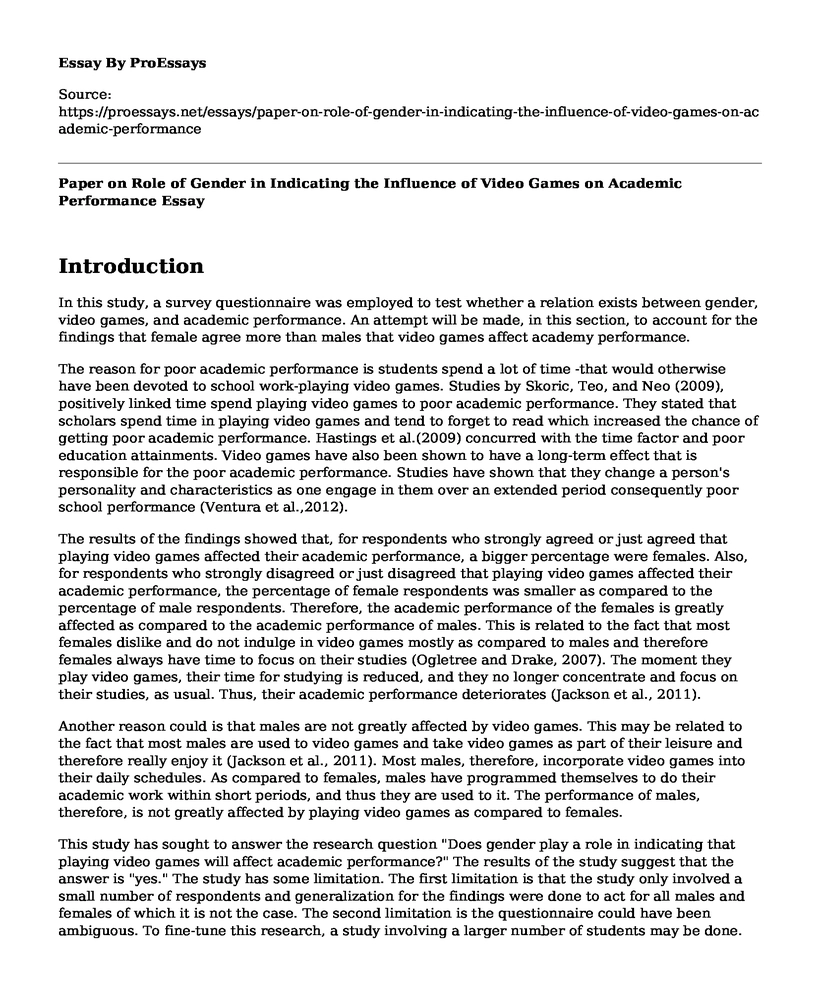Introduction
In this study, a survey questionnaire was employed to test whether a relation exists between gender, video games, and academic performance. An attempt will be made, in this section, to account for the findings that female agree more than males that video games affect academy performance.
The reason for poor academic performance is students spend a lot of time -that would otherwise have been devoted to school work-playing video games. Studies by Skoric, Teo, and Neo (2009), positively linked time spend playing video games to poor academic performance. They stated that scholars spend time in playing video games and tend to forget to read which increased the chance of getting poor academic performance. Hastings et al.(2009) concurred with the time factor and poor education attainments. Video games have also been shown to have a long-term effect that is responsible for the poor academic performance. Studies have shown that they change a person's personality and characteristics as one engage in them over an extended period consequently poor school performance (Ventura et al.,2012).
The results of the findings showed that, for respondents who strongly agreed or just agreed that playing video games affected their academic performance, a bigger percentage were females. Also, for respondents who strongly disagreed or just disagreed that playing video games affected their academic performance, the percentage of female respondents was smaller as compared to the percentage of male respondents. Therefore, the academic performance of the females is greatly affected as compared to the academic performance of males. This is related to the fact that most females dislike and do not indulge in video games mostly as compared to males and therefore females always have time to focus on their studies (Ogletree and Drake, 2007). The moment they play video games, their time for studying is reduced, and they no longer concentrate and focus on their studies, as usual. Thus, their academic performance deteriorates (Jackson et al., 2011).
Another reason could is that males are not greatly affected by video games. This may be related to the fact that most males are used to video games and take video games as part of their leisure and therefore really enjoy it (Jackson et al., 2011). Most males, therefore, incorporate video games into their daily schedules. As compared to females, males have programmed themselves to do their academic work within short periods, and thus they are used to it. The performance of males, therefore, is not greatly affected by playing video games as compared to females.
This study has sought to answer the research question "Does gender play a role in indicating that playing video games will affect academic performance?" The results of the study suggest that the answer is "yes." The study has some limitation. The first limitation is that the study only involved a small number of respondents and generalization for the findings were done to act for all males and females of which it is not the case. The second limitation is the questionnaire could have been ambiguous. To fine-tune this research, a study involving a larger number of students may be done.
Conclusion
However, if the limitation could be overlooked, the study has significant implications for the role played by gender in indicating the effect of playing video games on academic performance. The implication is that females should not indulge much in playing video games as compared to males so that they focus much on their studies and to avoid much distraction. But generally, video games influence the academic performance of students thus playing video games should be minimized for students to have much time to concentrate and focus on their studies.
References
Hastings, E. C., Karas, T. L., Winsler, A., Way, E., Madigan, A., & Tyler, S. (2009). Young children's video/computer game use: relations with school performance and behaviour. Issues in mental health nursing, 30(10), 638-649.
Jackson, L. A., Von Eye, A., Witt, E. A., Zhao, Y., & Fitzgerald, H. E. (2011). A
longitudinal study of the effects of Internet use and video game playing on academic performance and the roles of gender, race, and income in these relationships. Computers in Human Behavior, 27(1), 228-239.
Ogletree, S. M., & Drake, R. (2007). College students' video game participation and
perceptions: Gender differences and implications. Sex Roles, 56(7-8), 537-542.
Quaiser-Pohl, C., Geiser, C., & Lehmann, W. (2006). The relationship between
computer-game preference, gender, and mental-rotation ability. Personality and Individual Differences, 40(3), 609-619.
Skoric, M. M., Teo, L. L. C., & Neo, R. L. (2009). Children and video games: addiction, engagement, and scholastic achievement. Cyberpsychology & behaviour, 12(5), 567-572.
Ventura, M., Shute, V., & Kim, Y. J. (2012). Video gameplay, personality and academic performance. Computers & Education, 58(4), 1260-1266.
Cite this page
Paper on Role of Gender in Indicating the Influence of Video Games on Academic Performance. (2022, Apr 04). Retrieved from https://proessays.net/essays/paper-on-role-of-gender-in-indicating-the-influence-of-video-games-on-academic-performance
If you are the original author of this essay and no longer wish to have it published on the ProEssays website, please click below to request its removal:
- Paper Example on Leisure Activities and Recreational Culture
- Stealth Assessment in Games - Essay Sample
- Essay Sample on The Future of Video Games
- Essay Sample on Video Games & Negative Impact on Kids: Effects & Solutions
- Essay on Microtransactions: Advantages & Disadvantages in Video Games
- Exploring the Growing Popularity of Gaming: Casual and Hardcore Gamers - Essay Sample
- Video Games: An Unfortunate Misunderstanding - Essay Sample







